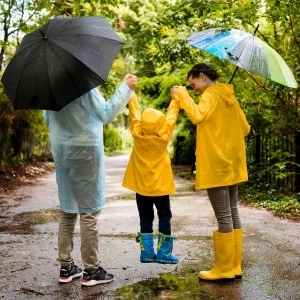The rainy season is here. The one where the heat of the summer is lowered and you get to dance or enjoy the breeze with sprinkle of water drops. But wait! In this all fun we miss something so important. Guess what it is ? Healthcare in the Rainy Season! Yes. In that excitement of rain we try eating things can cause disease. Also, it is not just you and me enjoying the rain, many infectious and harmful disease also enjoy it a lot. Let\'s dive into the delicious danger of rainy season street food along with other conditions of health related to this favourite but a little risky season.
Keeping a check on Healthcare in the Rainy Season
What Makes Rainy Season Street Food Risky?
Are you sure your favourite place has clean water?
- Rainwater and Flooding: Heavy rains often lead to flooding, mixing sewage with clean water sources. Vendors might not have access to clean water for cooking or cleaning.
- Waterborne Diseases: This increases the risk of diseases like cholera, typhoid, and gastroenteritis.
What is the chaat made of?
- Dirty Produce: Healthcare in the Rainy Season includes avoiding wrong food. Vegetables and fruits may not be washed properly, carrying bacteria and parasites.
Are you sure it is hygienic?
- Open-Air food items: Maintaining cleanliness in open-air environments is tough, especially with mud and puddles everywhere.
- Sanitation Issues: Street food sellers might not have access to proper sanitation facilities, leading to cross-contamination.
- Pests: Increased presence of flies and rodents during the rainy season can contaminate food.
May be it is not kept properly!
- Improper Storage: Fluctuating temperatures can lead to improper storage conditions, causing food to spoil.
- Lack of Refrigeration: Sometimes your favourite food is not kept in right cooling. What does this mean? It means to keep food at safe temperatures, allowing harmful bacteria to not grow
Healthcare in the Rainy Season with Food Illness
The heart wants what it wants, and we know, and the mouth helps him. There is however one thing, while we enjoy the food we miss that healthcare in the Rainy Season can easily be affected by the contamination when having outside food.
Eating contaminated street food can lead to:
- Symptoms: Diarrhea, vomiting, abdominal pain, and fever.
- Vulnerable Groups: Children, the elderly, and those with weakened immune systems are at higher risk.
- Complications: Dehydration and other serious health issues.
How do we prevent this and take measure?
Now if we say that healthcare in the Rainy Season needs extra attention, do we stop eating outside forever? No! Definitely not. But we can keep in mind these thing:
Be careful where you eat from:
Yummy Golgappas but the person does not maintain good hygiene practices, leave that stall at once.
Look for those who cover their food, use gloves, and have a clean cooking area.
Check for Freshness:
Pay attention to the freshness of what you are eating. Avoid items that appear stale or have been left out in the open for very long.
Ensure Proper Cooking:
Make sure that the food is cooked thoroughly. High temperatures can kill most pathogens. Avoid raw or undercooked items, especially meats and seafood.
Stay Hydrated Safely:
Avoid drinks made with potentially contaminated water or ice. Opt for bottled water or beverages from trusted sources.
Personal Hygiene:
Practice good personal hygiene. Wash your hands regularly with soap and clean water before eating. Carry hand sanitizer for situations where washing hands may not be possible.
Boost Immunity:
Strengthening your immune system can also help reduce the risk of foodborne illnesses. A balanced diet, regular exercise, and adequate sleep are essential components of good health.
Diseases if Healthcare in the Rainy Season not take care of!
It is now time to see what health concerns can be there if there is not proper action and above preventions done to have best healthcare in the rainy season. Here are some of the major health conditions to watch out for during the rainy season:
Cholera: Caused by contaminated water, cholera leads to severe diarrhea and dehydration. It can be life-threatening if not treated promptly.
Typhoid: Another waterborne disease, typhoid fever is caused by the Salmonella typhi bacteria. Symptoms include high fever, weakness, stomach pain, and loss of appetite.
Dengue Fever: Spread by the Aedes mosquito, dengue causes high fever, severe headache, pain behind the eyes, joint and muscle pain, rash, and mild bleeding.
Malaria: Transmitted by the Anopheles mosquito, malaria symptoms include fever, chills, and flu-like illness. If not treated, it can cause severe complications and even death.
Chikungunya: Another disease spread by mosquitoes, chikungunya causes fever and severe joint pain, along with muscle pain, headache, nausea, fatigue, and rash.
Fungal Infections: The damp and humid conditions of the rainy season create an ideal environment for fungal infections like athlete\'s foot, ringworm, and yeast infections.
Bacterial Infections: Skin infections caused by bacteria, such as cellulitis and impetigo, can also be more common during the rainy season.
Pay extra attention to healthcare in the rainy season
The “cham cham” barrish is good but taking care is important. A health body enjoys a lot of things. The rainy season, while beautiful and refreshing, comes with its own set of health challenges. Being aware of these health conditions and taking appropriate preventive measures can help you enjoy the season without falling ill. Stay healthy, prioritize Take steps to protect yourself and your family from these common rainy season ailments. Stay healthy and enjoy the rains!



